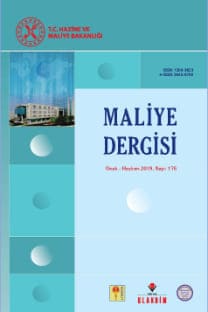Türkiye’de Tüketim ile Belirsizlik Arasındaki Asimetrik İlişki: Doğrusal Olmayan ARDL Yaklaşımı
Asymmetric Relationship between Consumption and Uncertainty in Turkey: Nonlinear ARDL Approach
___
Ahir, H., Bloom, N. ve Furceri, D. (2018), The World Uncertainty Index. http://www.policyuncertainty.com/media/WUI_mimeo_10_29.pdf (Erişim Tarihi: 22.08.2020)Bahmani-Oskooee, M. ve Nayeri, M.M. (2020), “Policy Uncertainty and Consumption in G7 Countries: An Asymmetry Analysis”, International Economics, 163, 101-113.
Banks, J., Blundell, R. ve Brugiavini, A. (2001), “Risk Pooling, Precautionary Saving and Consumption Growth”, The Review of Economic Studies, 68(4), 757-779.
Bernanke, B.S. (1983), “Irreversibility, Uncertainty, and Cyclical Investment”, The Quarterly Journal of Economics, 98(1), 85-106.
Bloom, N. (2009), “The Impact of UncertaintyShocks”, Econometrica, 77(3), 623-685.
Granger, C.W. ve Yoon, G. (2002), “Hidden Cointegration”, Economics Working Paper.
Guariglia, A. ve Rossi, M. (2002), “Consumption, Habit Formation, and Precautionary Saving: Evidence from the British Household Panel Survey”, Oxford Economic Papers, 54(1), 1-19.
Hahm, J.H. ve Steigerwald, D.G. (1999), “Consumption Adjustment under Time-Varying Income Uncertainty”, Review of Economics and Statistics, 81(1), 32-40.
Hall, R.E. (1978), “Stochastic Implications of the Life Cycle-Permanent Income Hypothesis: Theory and Evidence”, Journal of Political Economy, 86(6), 971-987.
Iyke, B.N. ve Ho, S.Y. (2019), “Consumption and Exchange Rate Uncertainty: Evidence from Selected Asian Countries”, The World Economy.
Menegatti, M. (2007), “Consumption and Uncertainty: A Panel Analysis in Italian Regions”, Applied Economics Letters, 14(1), 39-42.
Menegatti, M. (2010), “Uncertainty and Consumption: New Evidence in OECD Countries”, Bulletin of Economic Research, 62(3), 227-242.
Miles, D. (1997), “A Household Level Study of the Determinants of Incomes and Consumption”, The Economic Journal, 107(440), 1-25.
Pesaran, M.H., Shin, Y. ve Smith, R.J. (2001), “Bounds Testing Approaches to the Analysis of Level Relationships”, Journal of Applied Econometrics, 16(3), 289-326.
Shin, Y., Yu, B. ve Greenwood-Nimmo, M. (2014), “Modelling Asymmetric Cointegration and Dynamic Multipliers in a Nonlinear ARDL Framework”, R. Sickles ve W.C. Horrace (der.), Festschrift in honor of Peter Schmidt içinde, New York: Springer, 281-314.
Vural, B.M., Koç, Ş.A. ve Vural, K. (2010), “Belirsizliğin Özel Tüketim Harcamaları Üzerindeki Etkisi: Türkiye Örneği”, Kocaeli Üniversitesi Sosyal Bilimler Enstitüsü Dergisi, 20(2), 107-126.
- ISSN: 1300-3623
- Yayın Aralığı: Yılda 2 Sayı
- Başlangıç: 1973
- Yayıncı: Hazine ve Maliye Bakanlığı
Yapısal Reformların Ekonomik Büyüme Üzerindeki Etkileri: Geçiş Ekonomilerinden Kanıtlar
Muhammet DAŞTAN, Ömer YALÇINKAYA, Kerem KARABULUT
Vergi Yapısının Yurt İçi Tasarruflar Üzerindeki Etkisi: Türkiye’den İller Düzeyinde Bir Kanıt
Ersin Nail SAĞDIÇ, İnci SANDALCI
Faiz Dışı Fazlanın Ekonomik Büyümeye Etkisi: Türkiye Ekonomisi Üzerine Doğrusal Olmayan Bir Analiz
Asimetrik Bilgi Bağlamında Ekonomi ve Fizik Bilimi İlişkisi
Gülsüm GÜRLER HAZMAN, Neslihan KARAKUŞ BÜYÜKBEN
Türkiye’de Alt Kategorilerle Kamu Harcamaları ve Kamu Gelirleri Arasında Nedensellik İlişkisi
Enflasyon ve Faiz İlişkisi: OECD Ülkeleri Üzerine Panel Regresyon ve Nedensellik Analizleri
İbrahim Halil SUGÖZÜ, Sema YAŞAR
Ahmet AYSU, Miraç Fatih İLGÜN, Gökhan ÇOBANOĞULLARI
Kamu Sosyal Transfer Harcamalarının Kişisel Gelir Dağılımına Etkisi
